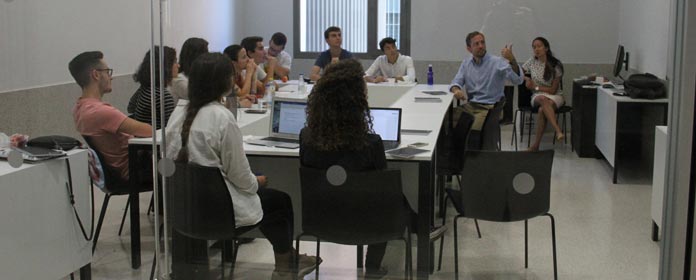Addiction to social networks, the 'dictatorship of the like' and the dark side of the web: students reflect on technology in an ICS initiative
Javier García-Manglano, researcher principal of 'Youth in transition', leads this series of seminars aimed at students of different degrees.

PHOTO: Isabel Solana
Why do the big tech companies keep us hooked? Do we live in the dictatorship of the 'like'? Are we free in a sea of algorithms that decide for us? Is it possible to avoid abuses on the web?
Since last September 28, a group of students from different careers meet every two weeks to reflect on the influence of technologies in their lives, in their relationships and in society in general. The initiative is promoted by Javier García-Manglano and Charo Sádaba, principal investigators of the project ' 'Youth in transition' of the Institute for Culture and Society (ICS), the research center at Humanities and social sciences of the University of Navarra.
Young people," says García-Manglano, "are the ones who can teach us the most about technology. Not only or mainly because they are its most avid and innovative users; but because they reveal, better than anyone else, its positive potential". He adds that "we are puzzled and frightened by the 'new' in technology, but listening to young people we discover that, like us at their age,what they are basically looking for is to respond to basic human needs: to know oneself, to feel validated, to belong to a group, etc."
Claudia López, psychologist and collaborator of project, highlights the need to work with students: "It is important to listen to them, to know their concerns and understand their ambivalent relationship with technology: they are more reflective than we sometimes assume. But first we have to give them the opportunity to express themselves, to understand them from their perspective".
In small groups, students are responsible for a topic: they consult bibliography and audiovisual material, do research... and then moderate the discussion with García-Manglano's financial aid . Also, at the end of the semester they will write a text with their conclusions, concerns, proposals or possible lines for future research. The topics to be addressed range from artificial intelligence to the phenomenon of influencers, including social networks, the addictive design and the polarizing consequences of content personalization.
External speakers and visits to companies and trade fairsLater on, it is also planned to have the testimony of external speakers and entrepreneurs working in related sectors and industry, and to visit companies and fairs such as the '4 Years from Now' (within the Mobile World Congress that takes place every year in Barcelona).
Gabriela Castelló, a third year student of Degree in Economics, Leadership and Governance, is one of the participants. knowledge She says she is looking forward to attending: "I hope to have a lot of dialogue, go deeper into very interesting topics with people who think differently and have a better understanding of the challenges we young people face".
He says these challenges include mobile 'addiction', the impact of social networks, the problems of early exhibition to technologies... "We have to consider and understand all this very well because our world is going in that direction," he acknowledges. It is our responsibility to decide how we want it to develop".




